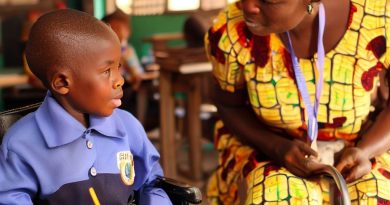A Comparative Study: Health Educators in Nigeria vs The World
Last Updated on September 22, 2023
Introduction
Health educators in Nigeria play a crucial role in promoting public health by providing essential information and guidance. Health Educators in Nigeria vs The World is our focus here
The purpose of this blog post is to compare the role of health educators in Nigeria with those in other parts of the world.
Health educators in Nigeria are dedicated professionals who aim to improve public health by imparting knowledge and skills to individuals.
They educate people on various health issues such as disease prevention, hygiene practices, and healthy lifestyle choices.
Through their efforts, they empower individuals to make informed decisions about their health.
Comparing the role of health educators in Nigeria with those in other parts of the world reveals both similarities and differences.
In Nigeria, health educators face unique challenges such as limited resources and cultural barriers.
However, they also possess a deep understanding of the local context and are well-equipped to address the specific health needs of their community.
In other parts of the world, health educators may have access to more advanced tools and resources, enabling them to reach a larger audience and implement innovative health promotion strategies.
They may also benefit from strong government support and a well-established healthcare system.
By comparing the experiences of health educators in Nigeria with their counterparts in other countries, we can gain valuable insights that can inform best practices and contribute to global efforts in promoting public health.
This blog post will explore various aspects such as training, scope of practice, and challenges faced by health educators in Nigeria and the world.
In the end, health educators in Nigeria play a vital role in promoting public health, despite facing unique challenges.
By comparing their role with health educators in other parts of the world, we can learn from each other and work towards a healthier future for all.
Health Education in Nigeria
In Nigeria, the current state of health education is far from satisfactory. The lack of adequate education and awareness about health issues poses a significant challenge to public health in the country.
Health education plays a crucial role in addressing public health challenges in Nigeria.
By creating awareness and promoting healthy behaviors, it has the potential to prevent diseases and improve the overall health of the population.
There are several examples of health education campaigns and programs in Nigeria that have made a positive impact.
One such campaign is the “Clean Nigeria: Use the Toilet” initiative, which aims to promote proper sanitation practices and reduce open defecation.
Another noteworthy program is the “Stop Mother-to-Child Transmission of HIV” campaign, which focuses on educating pregnant women about the prevention and transmission of HIV/AIDS.
Through this program, women are empowered with knowledge and are able to make informed decisions to protect themselves and their babies.
Additionally, the Nigerian government has launched the National Health Promotion Policy, which provides a framework for implementing health education programs across the country.
This policy emphasizes the importance of preventive healthcare and aims to reduce the burden of diseases through education and awareness.
Despite these efforts, there are still significant challenges in implementing effective health education in Nigeria.
Limited funding, resource constraints, and cultural barriers are some of the obstacles that hinder the progress of health education initiatives.
Furthermore, there is a need for collaboration between different stakeholders, including the government, healthcare providers, educators, and community leaders, to ensure the success of health education programs.
By working together, they can share resources and expertise to address public health challenges more effectively.
In fact, the current state of health education in Nigeria is faced with numerous challenges. However, its importance cannot be overstated in addressing public health issues.
Through effective campaigns and programs, Nigeria has the potential to improve the health outcomes of its population and create a healthier future for all.
Read: Challenges and Opportunities for Health Educators in Nigeria
Health Education in Other Countries
Overview of health education systems in developed countries
In developed countries, health education systems are well-established and comprehensive. They prioritize preventive measures through education and community outreach.
The role and impact of health educators in those countries
Health educators in these countries play a crucial role in promoting healthy lifestyles and disease prevention.
They are responsible for designing and implementing programs that address various health issues. The impact of health educators in developed countries is significant.
They work closely with healthcare professionals to raise awareness about common diseases, such as heart disease, diabetes, and cancer, and promote healthy behaviors to prevent them.
Resources and support available to health educators in Nigeria with those in other countries
The resources and support available to health educators in these countries are extensive.
They have access to state-of-the-art facilities, technology, and research resources that enable them to stay updated with the latest scientific developments.
In addition, health educators in developed countries receive continuous training and professional development opportunities to enhance their skills and knowledge.
This ongoing support helps them provide the best possible education and support to the communities they serve. Furthermore, funding for health education programs is generally higher in developed countries.
Government agencies and healthcare organizations invest significant resources to ensure that comprehensive health education initiatives are implemented effectively.
Comparatively, Nigeria faces numerous challenges in terms of resources and support for health educators.
Limited funding, inadequate infrastructure, and scarcity of trained professionals hinder effective health education in the country.
Unlike in developed countries, health educators in Nigeria often struggle with outdated technology, limited access to relevant research materials, and a lack of professional development opportunities.
These constraints hamper their ability to provide up-to-date and evidence-based health education.
However, despite these challenges, health educators in Nigeria play a vital role in promoting public health.
They often work in overcrowded and resource-limited settings, utilizing their creativity and ingenuity to deliver health education to diverse populations.
To bridge the gap, increased investment in health education resources, training programs, and infrastructure is necessary.
Collaboration between government agencies, non-profit organizations, and international partners can enhance the effectiveness of health education in Nigeria.
In a nutshell, health education systems in developed countries are well-established and well-supported, allowing health educators to make a significant impact on public health.
While Nigeria faces challenges in terms of resources and support, dedicated health educators continue to play a crucial role in promoting health and wellness in the country.
Read: Navigating the Health Education Career Path in Nigeria
Challenges Faced by Health Educators in Nigeria
- Insufficient government support affects the effectiveness of health education programs in Nigeria.
- Low awareness levels among the population pose a challenge to health educators in Nigeria.
- Limited access to healthcare facilities and resources hinders health education efforts in Nigeria.
- Language and communication barriers make it difficult for health educators to deliver messages effectively.
- Traditional beliefs and cultural practices often clash with modern health education concepts.
- Inadequate training and professional development opportunities for health educators hinder their effectiveness.
- Lack of community involvement and participation in health education initiatives affects their sustainability.
- Stigmatization of certain health conditions makes it challenging for health educators to address them openly.
Impact of Limited Resources, Inadequate Funding, and Cultural Barriers
In Nigeria, the impact of limited resources, inadequate funding, and cultural barriers on health education efforts is significant.
- Limited resources restrict the availability of educational materials, training programs, and infrastructure for health educators.
- Inadequate funding negatively affects the quality and reach of health education initiatives in Nigeria.
- Cultural barriers, such as traditional beliefs and practices, can shape attitudes towards health education and hinder behavior change.
- Language barriers make it challenging for health educators to convey their messages effectively, especially in diverse ethnic communities.
- Limited access to healthcare facilities and services due to inadequate resources further hampers health education efforts.
Innovative Approaches Adopted by Nigerian Health Educators
Despite the challenges they face, Nigerian health educators have adopted innovative approaches to overcome these obstacles.
- Utilizing mobile technology and social media platforms to reach a wider audience with health education messages.
- Partnering with local NGOs and community leaders to gain trust and enhance community participation.
- Developing culturally appropriate communication strategies and materials to bridge the gap between traditional beliefs and modern health concepts.
- Training and empowering community health workers to deliver health education at the grassroots level.
- Implementing peer-to-peer education programs to engage youth and promote behavior change.
Read: Day in The Life: Understanding the Tasks of a Health Educator in Nigeria

Best Practices in Health Education
When it comes to health education, there are a number of best practices that have been observed in different parts of the world.
These practices can serve as valuable lessons for Nigerian health educators, helping them improve their own methods and adapt to the Nigerian context.
In this section, we will highlight some of these best practices and provide recommendations for improving health education in Nigeria.
1. Tailoring health education programs to the target audience
One of the key best practices in health education is tailoring programs to the specific needs of the target audience.
This means considering factors such as age, cultural background, literacy levels, and language proficiency.
By doing so, health educators can ensure that their messages are effectively communicated and understood by the intended audience.
2. Utilizing interactive and participatory teaching methods
Another important best practice is the use of interactive and participatory teaching methods. This includes activities such as group discussions, role-plays, case studies, and hands-on demonstrations.
By actively involving participants in the learning process, health educators can enhance engagement, knowledge retention, and behavior change.
3. Incorporating technology and multimedia
In today’s digital age, the use of technology and multimedia is a highly effective best practice in health education.
This can include the use of videos, presentations, mobile applications, and social media platforms.
By utilizing these tools, health educators can reach a wider audience, enhance visual learning, and improve the accessibility of health information.
4. Building partnerships and collaborations
Collaboration between different stakeholders is crucial for successful health education.
Best practices involve building partnerships with community organizations, schools, healthcare providers, and government agencies.
These collaborations can help leverage resources, share expertise, and create a coordinated approach to health promotion.
5. Incorporating cultural sensitivity
Cultural sensitivity is paramount in health education, and it is a best practice to integrate cultural values and beliefs into the program.
By doing so, health educators can establish trust, credibility, and relevance with the target audience.
This includes considering local traditions, customs, and socio-cultural norms when designing and delivering health education initiatives.
Read: Insights into the Teaching Profession in Nigeria Today
Recommendations for Improving Health Education in Nigeria
While Nigeria has made progress in health education, there is always room for improvement. To enhance the effectiveness of health education in Nigeria, the following recommendations are suggested:
1. Strengthen partnerships and collaborations
Nigerian health educators should actively seek partnerships with local organizations, healthcare providers, and government agencies.
By working together, they can pool resources, share knowledge, and create a more coordinated and impactful approach to health education.
2. Develop context-specific educational materials
Health educators in Nigeria should create educational materials that are tailored to the local context.
This includes using local languages, considering the literacy levels of the target audience, and addressing cultural beliefs and practices.
By doing so, they can ensure that health information is effectively understood and applied.
Read: A Comprehensive Overview of Special Education in Nigeria
3. Utilize technology and multimedia tools
Adapting to the digital age, Nigerian health educators should embrace the use of technology and multimedia tools.
This includes developing mobile applications, creating informative videos, and utilizing social media platforms to disseminate health messages to a wider audience.
4. Incorporate interactive and participatory methods
Health educators should actively engage participants through interactive and participatory teaching methods.
This includes incorporating group discussions, role-plays, and hands-on activities to enhance learning and promote behavior change.
5. Continuous professional development
Nigerian health educators should prioritize continuous professional development to stay updated with the latest best practices, research findings, and evidence-based approaches in health education.
This can be achieved through attending conferences, workshops, and online courses.
By learning from the best practices observed in different parts of the world and adapting them to the Nigerian context, health educators in Nigeria can enhance the effectiveness of health education programs.
It is crucial for Nigerian health educators to tailor their programs, utilize interactive teaching methods, incorporate technology, build partnerships, and incorporate cultural sensitivity.
By implementing these recommendations and continuously improving their practices, health education in Nigeria can reach new heights and make a significant impact on public health.
Read: The Impact of Health Educators in Improving Nigeria’s Healthcare
Conclusion
This blog post has highlighted the key differences between health educators in Nigeria and the rest of the world.
We have discussed the importance of health education in Nigeria and its potential to improve public health outcomes.
Health education plays a crucial role in empowering individuals to make informed decisions about their health, prevent diseases, and adopt healthy lifestyles.
However, in Nigeria, there are several challenges that hinder the effectiveness of health education programs.
Nigeria needs increased support and investment in health education to overcome these challenges and improve public health outcomes.
By doing so, we can address the prevailing health issues, such as high maternal mortality rates, infectious diseases, and lack of access to adequate healthcare services.
To achieve this, governments, non-governmental organizations, and international partners must prioritize health education in Nigeria.
This includes providing funding for training health educators, developing culturally relevant and accessible health education materials, and integrating health education into the national curriculum.
Investing in health education in Nigeria will not only lead to better health outcomes for individuals but also a healthier population as a whole.
It is a sustainable approach that can empower the Nigerian people to take control of their health and well-being.
Let us join hands and advocate for increased support and investment in health education in Nigeria. Together, we can make a difference and improve the health of the nation.


